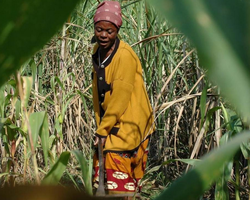
Workers tend to fields of sugar cane at Xinavane, north of Mozambique's capital Maputo, June 12, 2005 (Photo: Reuters)
Despite hunger, Mozambique leases huge land holdings to foreigners
by Chris Arsenault
ROME, Feb 19 (Thomson Reuters Foundation) - Mozambique, a country wracked by hunger, has signed away land concessions three times larger than Greater London to outside investors in the past decade, displacing thousands of farmers in the process, said a report released on Thursday.
Since 2006, the country has signed at least 35 long-term land leases, covering more than 535,000 hectares, Mozambique's National Peasants Union (UNAC), a farmers' group, reported after surveying public records and interviewing displaced farmers.
New large plantations, often joint ventures between foreign investors and politically-connected local officials, are producing food for export rather than feeding hungry local people, advocates said.
An "alarmingly high" number of Mozambican children under five - more than 42 percent - are malnourished, according to the World Food Programme.
"The small farmers who feed this country, producing over 90 percent of the food are now losing their land to make way for these large investments," Vicente Adriano, a UNAC spokesperson told the Thomson Reuters Foundation.
"The focus of these investments is on the production of soybeans and corn for export ... to emerging markets in Asia and Europe."
About 70 percent of Mozambicans live in rural areas and depend on subsistence farming for survival, according to the United Nations.
Thousands of these farmers have been forced from their land to make way for foreign-backed plantations, particularly in the fertile Nacala Corridor in northern Mozambique, the report said.
While the country has experienced rapid economic growth in recent years, one third of the population of 24.5 million still face food shortages.
Campaigners say such high levels of hunger mean land should be used to grow food for local people, rather than leased to large firms to produce cash crops for export.
Foreigners cannot directly buy land in Mozambique, but they can make long-term leases for several decades or invest in joint ventures with local businessmen, Adriano said.
In one case cited by the report, Mozambique Agricultural Corporation (MOZACO), a joint venture between local and foreign investors, acquired 2,389 hectares of land in Nampula province to grow soybeans and cotton in June 2013.
The new plantation evicted 1,500 people who had been farming the land, without compensation, according to local residents cited in the report. They said plantation officials destroyed the local church of Santa Lucia.
The firm wants to expand its plantations to 20,000 hectares and activists say this will displace thousands more, depriving others of crucial water resources from the Malema and Nataleia rivers.
MOZACO does not publicly list its address or phone number and could not be reached for comment.
JFS Holding, owned by a prominent family in Portugal, is one of the investors in MOZACO, the report said. The company did not respond to interview requests.
Often foreign land deals are organised by obscure holding companies registered in offshore locations, making the true backers of projects difficult to track, the report said.
Many farming families in Mozambique do not have individual title to the fields they farm, relying instead on customary land rights.
Families who have been farming a parcel of land for ten years or more are supposed to be legally protected from eviction without compensation, the report said, although these land laws often are not enforced.
Phone numbers for Mozambique's ministry of agriculture were not in service or rang unanswered.
(Additional reporting by Marta Machado Gooder in Porto, Portugal, Editing by Ros Russell)












